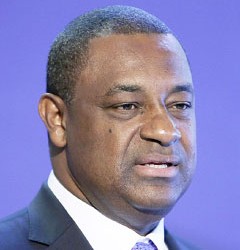By Brent Fuller
The head of Fidelity Bank in the Cayman Islands confirmed Monday that representatives of his bank approved a US$240,000 loan to local businessman Jeffrey Webb in June 2011 that was made to a company controlled by Webb and former Trinidadian politician Jack Warner.
The loan was called “intriguing” by Crown prosecutors who are seeking to convict Webb’s close friend and business associate Canover Watson in relation to corruption-related offenses connected to the December 2010 award of a public hospital contract which they allege Watson directed as chairman of the hospital’s board of directors. Webb is also charged with aiding and abetting Watson, but he is not currently facing trial in the Cayman Islands.
The cash from the Fidelity Bank loan had nothing to do with the CarePay patient swipe-card contract, prosecutors have alleged. Instead, they claim, the money went to pay off a portion of a home loan for a property Webb bought in suburban Atlanta, Georgia.
Fidelity Bank Cayman Islands Chief Executive Roger Brett Hill testified Monday that a three-month loan was sought from Fidelity by a Cayman Islands-registered company known as J&D International. Webb was listed as a director of the company. Other directors of the company included former Cayman Islands resident Costas Takkas and Warner, both of whom are facing charges in connection with the U.S. criminal investigation into FIFA, world football’s governing body.
The J&D loan sought US$240,000 and raised some questions among Fidelity Bank managers, prosecutors said. The managers wanted to know what kind of business J&D International conducted and what it had to do with the CarePay contract.
Fidelity Bank managers sent six questions to Webb regarding the loan request prior to the pay-out. Mr. Hill testified Monday that these were standard due diligence questions the bank would ask of anyone seeking to obtain such a loan. He also confirmed that Webb worked at Fidelity Bank at the time the loan was sought.
Prosecutors said Webb forwarded the questions from the bank to Watson to answer for him. The Crown said Watson answered by stating that J&D International sought to “invest” in AIS Cayman Ltd., which was expanding its operations to the U.S. AIS Cayman Ltd. was the local branch of the company that was awarded the CarePay contract in December 2010.
Prosecutors have alleged that Webb and Watson controlled AIS Cayman through the use of “sham” directors.
The US$240,000 loan was granted to J&D, and the money was transferred to the AIS Cayman Ltd. account and then sent to a Wells Fargo account in the U.S. to help pay off the money prosecutors said Webb owed on his Loganville, Georgia home.
In September 2011, when the loan repayment was due, US$1.2 million had been placed in the AIS Cayman Ltd. bank account as a result of a contract Watson had agreed to with the Cayman Islands Ministry of Health for the expansion of the CarePay swipe-card system. The expansion never happened, although a total of US$1.8 million was paid by government based on officials’ belief that it would.
AIS account
Jurors in Watson’s trial have heard that an account was opened for AIS Cayman Ltd. at Fidelity Bank on Dec. 23, 2010, and that it was used to accept funds from the CarePay contract, which were then disbursed elsewhere, including to AIS’s parent company, a Jamaican-St. Lucian firm.
The three directors of AIS Cayman Ltd. were listed as Caymanians Joscelyn Morgan and Eldon Rankin and Jamaican national Douglas Halsall, who owned the Jamaican branch of AIS (Advanced Integrated Systems).
In order to deposit the money coming into AIS Cayman, prosecutors have alleged that Watson and Webb made arrangements to open an account at Fidelity Bank.
This was done via a letter submitted to the bank by Eldon Rankin, one of the named directors of AIS Cayman Ltd., according to Deputy Director of Public Prosecutions Patrick Moran.
“We suggest Mr. Watson wrote the letter … in Mr. Rankin’s name,” Mr. Moran said, raising doubts during the proceedings as to whether Mr. Rankin’s signature on the document was authentic.
About two years after the AIS account was opened, prosecutors said a request came from Webb to open online banking services on the AIS account.
Defense alleges jump drives missing
Seven portable USB computer memory sticks, typically called “jump drives” or “flash drives,” that were reviewed as part of the police investigation into Watson following his arrest in August 2014 have gone missing, his attorneys suggested Monday.
Evidence obtained by police from those jump drives was retrieved and copied during searches of Watson’s office at the former Admiral Administration building on Aug. 28 and Aug. 29, 2014. However, Watson’s lead attorney Trevor Burke, QC, suggested Monday that the jump drives themselves had not been located.
Mr. Burke, during questioning of a Crown witness who examined the jump drives, elicited that the witness could not find those drives upon a second search of Admiral Administration’s offices in July 2015. The attorney suggested that, aside from whatever was copied and preserved by police, other documentation on the drives had effectively been lost.
Some of those records, he suggested, may well have been used by Watson’s defense, even if police investigators and prosecutors had no use for them.
Both the IT director for the former Admiral Administration [now Maitland] and a Cayman Islands government computer forensics expert testified Monday that they were not aware what had occurred with the jump drives. (Cayman Compass)
For legal reasons, we are not accepting comments on this article.














